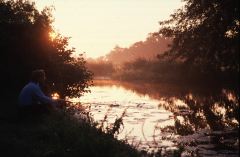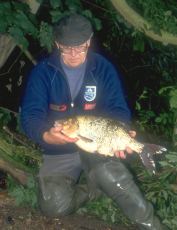I recently returned from a frustrating night session on a small Cavan lake. The lake holds big roach x bream hybrids and although the fishing can be painfully slow, maybe only one bite, often none, almost all fish hooked will be specimen size. I landed eight fish, including six hybrids, but none over the target 3lbs weight. I also had a number of missed or half-hearted offers. On any scale, the odds on me including a specimen in my catch were overwhelming. But it didn’t happen. On this particular venue, the number of fish and bites I had would be considered good, so I was reasonably content with my approach, refined after a couple of previous trips.
 The long drive home gave me ample time to mull over why I did not catch and I arrived at two conclusions. The first was simple bad luck, which should be rectified over time. The second was that the fish just refused to co-operate with my devious plans. I recalled a session earlier this year on the Grand canal in Sallins, where I took close to 50lbs of fish. My being there was entirely fortuitous. I had planned a trip to the Barrow after pike and perch but awoke to a slow puncture and did not trust the car to make the journey. My banker venue was Sallins Harbour where I have over the last few years had some exciting fishing. When the fish move into the harbour and are hungry, the sport on light tackle can be great.
The long drive home gave me ample time to mull over why I did not catch and I arrived at two conclusions. The first was simple bad luck, which should be rectified over time. The second was that the fish just refused to co-operate with my devious plans. I recalled a session earlier this year on the Grand canal in Sallins, where I took close to 50lbs of fish. My being there was entirely fortuitous. I had planned a trip to the Barrow after pike and perch but awoke to a slow puncture and did not trust the car to make the journey. My banker venue was Sallins Harbour where I have over the last few years had some exciting fishing. When the fish move into the harbour and are hungry, the sport on light tackle can be great.
However, I have also had many blank sessions here, with no fish showing, or worse, fish obviously present but disdainful of anything I offered to tempt them. This might point to a lack of skill on my behalf but I cannot believe this is the only explanation (I am ready to be stood corrected!).
That day on the canal, a massive shoal of perch lurked in the harbour, sheltering under a large commercial barge. Not 20yds away, an equally impressive shoal of small roach hung in the water. Periodically during the session the perch would leave their shelter and maraud through the small fish shoal, the surface erupting with fish, bubbles and dead reed stalks. After a minute or two, everything would subside and the two participants return to their corners.
I had been feeding and fishing a swim on the far bank between the two shoals. From this area I had been getting hybrids and good roach, but only a couple of perch and none of the small roach. I had no idea that the perch were stationed beneath the barge until an angler set up on the far side of the canal. He cast towards me and had two big perch in as many casts. I dropped a worm a rodlength out and proceeded to catch fish after fish until I packed up. The shoal had been present all the time. In fact the angler on the far bank told me that he had taken a big bag of perch the previous week in the spot I was fishing. The perch, however, showed no eagerness to move over the swim I had been assiduously baiting all morning, though only a number of yards away. When I placed my bait where the fish wanted it, I could do no wrong. Had the other angler not arrived, I may never have landed these perch.
When I began coarse fishing, one of the earliest lessons I learned was that you cannot catch fish that are not there. Especially on canal stretches and particularly after a drop in temperature, fish will hold up in areas chosen by themselves and if you are not near them, you won’t catch. Adopting the search technique another problem emerged – how to catch fish that are visibly there (or should be there if my angling theories are correct) but are not feeding!
The trigger that motivates a fish or shoal to feed is a complex puzzle for anglers, and not nearly as complicated for the fish. Hunger is obviously the primary stimulant but in Irish generally food-rich waters should not be an everyday problem. Situations such as grossly swollen rivers could obviously prevent fish feeding for a time and result in a binge, but stillwaters do not suffer to the same extent and fish activity here in seemingly identical conditions proves erratic.
Safety, light penetration, water temperature, wind direction all play a part but at such a finely critical level that it is nearly impossible for anglers to determine. Given that the majority of anglers I know, myself included, enjoy more modest days than bumper bags, it is easier to predict what will cause fish not to feed than the opposite!
This is not all desperation. We can, by analysing the times when good catches or fish were taken, come up with a range of conditions that have the possibility of producing exciting sport. Concentrated angling efforts during the existence of these ideal conditions should therefore give us a thrilling session every time we set forth.
This of course does not happen. The obvious reason being that the exact combination of the desired elements does not regularly occur, or when it does you are stuck in work or engaged in some other wasteful occupation. The other reason is that the fish simply do not co-operate and refuse to feed.
Let us assume that we are using good bait that the species would readily accept, and presented in such a way that the fish would usually not question. The groundbait is down, you are well hidden, but the float or tip refuses to budge. In these situations the thoughtful angler will start to experiment. Change baits, lengthen the snood, go down a hook size. Suddenly, a bite results and a fish is landed. A few or a lot more may follow. We put this down to the change in presentation and congratulate ourselves on our ingenuity. This may well have been the cause but it could equally well be true that whatever fish were present were motivated to feed by a stimulus unknown and unfathomable to us.
The number of times that the formula fails lends some credence to the latter explanation.
I have often read or heard of anglers spending a number of days on big fish waters in the quest for specimen fish. At the end of the sortie, an impressive list of specimens may be amassed. It is rare, however, that the pattern of takes are continuous or predictable. If the angler is doing it right the fish should show consistently and be just as catchable on day one as on the last day. Many reasons can be offered for this: the fish were full, the shoals had to become used to the bait, the weather was unsettled or the wind in the wrong quarter, they became spooked when one of their members disappeared kicking and screaming. All very valid and plausible. All very logical human reasoning. Another explanation is that the fish were around all the time but for some or many factors, decided to feed only when it suited them and damn the begrudgers!
Location is the hardest part of catching fish. It may come through luck, persistence or skilful watercraft. If a piece of water is known to contain a lot of fish or big fish, constant fishing will eventually produce the sought after result. If you are there regularly and assuming your basic technique is sound and your confidence high, the fish will feed at some stage.
This is why certain waters, known big fish producers, will receive the attention of travelling anglers. While in some people’s eyes this practice is perceived almost as unsporting, it is perfectly acceptable as an elimination of wasted time. Most of us have limited time to pursue our sport. If you know that fish are present, the use of a proven technique and the investment of a sufficient amount of time should produce that special catch.
When I first started fishing on the Barrow, I jumped around frantically trying to find the fish. I freely admit that I was new to the game and that my skill at reading conditions or environment was seriously lacking. My confidence slumped and one stretch of river looked as unpromising as the next. After numerous fruitless journeys, a friend finally landed a bream from a particular stretch. Suddenly I was more confident. I concentrated on this stretch and went on to take several good bags. My tactics had not changed. What I knew now was that along this short area, fish were known to be present and feed at certain times and that if I fished it enough, I would catch. I could refine my approach to catch more or better fish but the primary factor in my success was that fish would stop here and on occasion feed.
A victory for luck and persistence and not, much though I’d like to claim it, any skill, judgment or understanding on my part. Location was the key and after that the fishes willingness to take a bait. I have fished the river in what I have come to regard as ideal conditions, overcast with a chop on the water and not had a bite while my best catch came on a brilliantly warm and still June afternoon when I would have reckoned nothing would feed.
My experience on these different venues prompted me to think that once the fish are found, the rest is often up to the vagaries of the fish’s mind and not the deductive powers of the angler. The experienced match angler will admit that most competitions are won or lost at the draw. A good angler, that is one that will make the most of a given opportunity, on a good peg will win but the best angler in the world cannot catch fish that are not present or will not feed.
What we know from experience is that certain conditions or combinations thereof have in the past produced a memorable outcome. And it is the memory part that prompts us to derive our theories of fish behaviour. Our quarry, however, though in schools all their lives, have not grasped the concept of absolute formulas or human logic and often play dumb.










